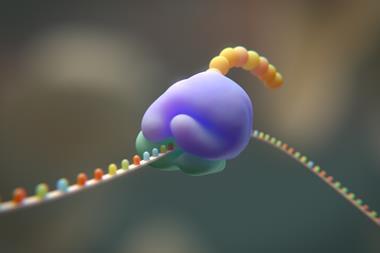Novartis contests India’s patent law
Swiss pharmaceutical company Novartis is suing the Indian government for contravening international patent agreements. The company accuses the Indian government of failing to comply with World Trade Organization (WTO) rules after it refused to grant the company a patent on its cancer drug Glivec. The case opened on 15 February in Chennai, India.
India signed up to the WTO’s Trade related intellectual property rights (Trips) patent regime when it joined the WTO in 1995. Novartis claims that the failure to acknowledge Glivec as an innovative drug means that India is operating outside these regulations. The Indian government rejects the claim, arguing that Glivec is an existing drug with only a minor alteration.
The French charity Medecins sans Frontieres (MSF) relies on drugs produced in India and is urging Novartis to ’back off’. ’So much of the developing world depends on generics,’ Sheila Shettle from MSF told Chemistry World. ’The Indian government is trying to maintain its populations’ access to affordable treatments by preventing companies like Novartis from repeatedly patenting new versions of existing drugs. If companies are able to do this in India, generics would be threatened.’
More than a quarter of a million people have now signed an MSF petition urging Novartis to drop the case, so that poor patients can continue to have access to cheaper generics. But Novartis says that patents help patients by stimulating the long-term research and development of much-needed new therapies.
Meanwhile, the Thai ministry of health has used an emergency safeguard in the Trips regulations to withdraw existing patents for two drugs and grant a compulsory license for the production of copies. Generic versions of Kaletra, an HIV treatment made by Abbott Laboratories, and Plavix, an anti blood clotting pill made by Sanofi-Aventis, will now be manufactured in Thailand.
A spokesperson for Novartis cited the Thai case as an example of the WTO’s safeguards for poorer countries working successfully. Under the regulations, governments can declare a national state of emergency, and issue compulsory licenses for the production of generic copies of drugs without consulting the foreign patent holder. Both Abbot and Sanofi-Aventis have expressed disappointment at the decision.
Victoria Gill
Dupont to eliminate Teflon chemical
Dupont has named 2015 as the year that it will stop the use of potentially dangerous perfluorooctanoic acid (PFOA) in Teflon production.
The announcement comes one year after the US chemical company promised the Environmental Protection Agency (EPA) that it would work towards eliminating PFOA from Teflon production following concerns about health risks. Dupont were found guilty, by a 2004 EPA investigation, of withholding evidence of the chemical’s adverse effects on employees’ health.
Maximum fine for Chinese chemical spill
Chinese company, Jilin Petrochemical, has been given the maximum possible fine for a toxic river spill that caused water supplies to millions of people to be cut off. The company was ordered to pay 1 million yuan (£64,000) after a blast at the plant in the Jilin province discharged an estimated 100 tonnes of the carcinogen benzene into the river. The city of Harbin lost its water supply for five days and parts of Russia were also affected.
WHO flu chief moves to Novartis
The former head of the World Health Organization’s Global influenza programme, Klaus Stöhr, has moved to Swiss drug company Novartis’ vaccines and diagnostics division, where he will lead the company’s development of seasonal and H5N1 virus. During his time at the WHO he advocated the development of vaccines against H5N1.
First non-prescription diet pill approved
The US Food and Drug Administration (FDA) has approved the first over the counter diet drug produced by UK pharmaceutical company GlaxoSmithKline. The drug, which goes by the brand name Alli, is a lipase inhibitor that blocks the activity of the enzyme that breaks down fat in the gut.
£1.1 million for robotic stem cells
The UK Chemistry and innovation knowledge transfer network has awarded a £1.1 million grant to scientists for development of robotics to automate stem cell research. The grant has been given to a consortium led by London-based biotech firm Plasticell.
Sigma-Aldrich buys Epichem
US chemical supplier Sigma-Aldrich has paid $60 million (£30.8 million) to purchase UK chemical maker Epichem, a manufacturer of chemicals for the semiconductor and solar panel industries. The UK firm will be incorporated into a division of Sigma-Aldrich that provides specialist chemicals for electronics manufacturers.
General Electric buys Abbott Laboratories
General Electric has signed a deal to purchase US pharmaceutical company Abbott Laboratories’ in vitro and point-of-care diagnostics business for $8.13 billion.
The US technology and services conglomerate is expected to finalise the acquisition deal in the first half of this year. Abbott will retain ownership of its molecular diagnostics and diabetes care businesses.
Unilever’s slump
Anglo-Dutch consumer giant Unilever announced lower than expected fourth quarter financial results, leaving it languishing with the worst performers of the FTSE 100. The company reported sales growth of just 3.4 per cent in its final quarter.
Bayer labelling settlement
Thirty US states, including Florida, Arizona and California, have reached an $8 million settlement with German chemical and pharmaceutical company Bayer, over allegations that it failed to adequately label packaging of its cholesterol-lowering drug Baycol (cerivastatin). Cases were filed against Bayer for failing to warn doctors and consumers about potential health risks posed by the drug.
Pharma gets mixed financial review
Profits are up but morale is shaky in the pharmaceutical industry. Results for the full financial year ending December 2006 were largely disappointing. In a year where the market was penalised by generics, there were some significant shake-ups.
Pfizer reported a meagre two per cent increase on 2005 revenues although profits were greatly boosted by the
$16.6 billion sale of its consumer healthcare business to Johnson & Johnson. At the same time, new CEO Jeffrey Kindler announced a restructuring of the company, including 10,000 job losses (see www.chemistryworld.org, 2 February 2007).
Sanofi-Aventis reported a healthy net profit increase of 11 per cent to €7 billion (£4.7 billion). Many US companies including Merck and Eli Lilly reported levels of profit increase between five and seven per cent with Bristol Myers-Squibb (BMS) reporting a downturn in profits from last year. The UK’s GlaxoSmithKline (GSK) fared slightly better with a 16 per cent increase on 2005. Swiss company Roche surprised investors with a record net profit rise of 34 per cent to £3.7 billion, beating its home rival Novartis.
AstraZeneca followed good news of a 28 per cent full year profit increase with news of job losses. With analysts predicting rocky times ahead, the Anglo-Swedish company is taking steps to boost its own ailing drug pipeline. It signed an $800 million deal with two smaller drug companies to develop drugs to treat chronic pulmonary disease (COPD) and obesity. The company also plans to invest $100 million to expand its Waltham research and development centre near Boston, US.
Dow fined for bribery
Dow Chemical has been fined $325,000 by the US Securities and exchange commission after its subsidiary, DE-Nocil crop protection, Mumbai, India, made improper payments to Indian government officials involved in making regulatory approvals of pesticides. An estimated $200,000 was paid to government officials between 1996 and 2001. None of the payments were accurately reflected in Dow’s books, according to a report from the Securities and exchange commission.
Cannabis drug for US market
GW Pharmaceuticals, which is licensed by the UK Home Office to work with a range of controlled drugs for medical research purposes, has entered into a long term strategic cannabinoid alliance with Japanese drug company Otsuka Pharmaceutical to develop and market Sativex, GW’s lead product, in the US.
In 2006, the Food and Drug Administration (FDA) permitted Sativex to enter directly into late stage development in the US for the treatment of pain in patients with advanced cancer, and GW and Otsuka currently plan for the first US pivotal efficacy clinical trial to be a Phase II/III cancer pain dose ranging study, to commence this year.
Energy goes bio
BP plans to invest $500m over the next ten years to establish a bioscience research laboratory attached to a consortium of universities, led by the University of California, Berkeley.
The Energy Biosciences Institute’s projects will include devising new biofuels and developing carbon sequestration techniques.












No comments yet